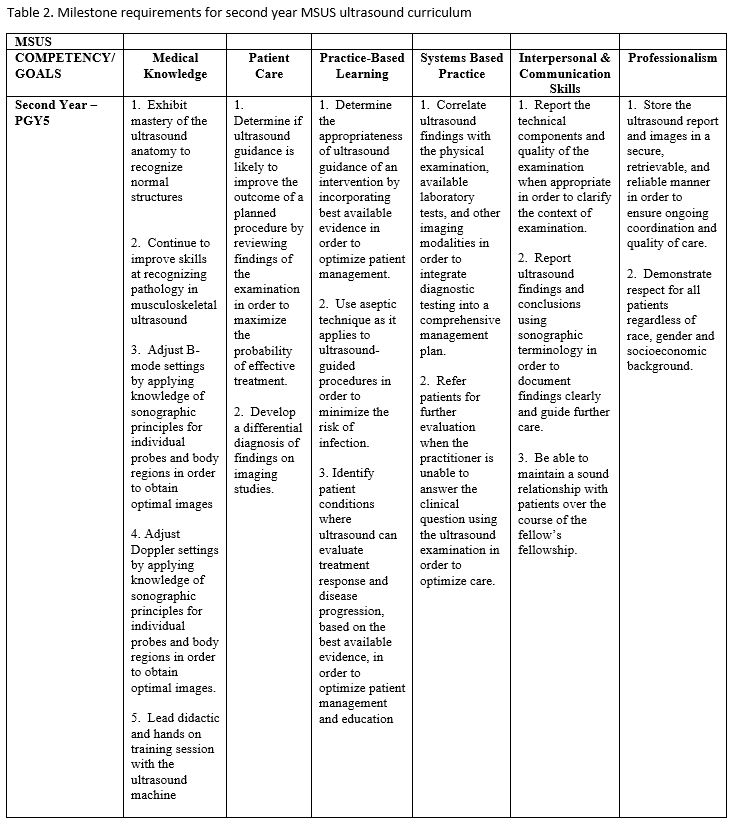Session Information
Date: Monday, November 9, 2020
Session Type: Poster Session D
Session Time: 9:00AM-11:00AM
Background/Purpose: Musculoskeletal Ultrasound has become a significant training tool in rheumatology fellowships. A recent survey showed 94% of rheumatology fellowships have implemented a teaching program for US with 41% having implemented a curriculum. The ACR developed a teaching curriculum as a model for programs in 2019, updating the core curriculum from 2015. Our institution started MSUS training in 2012 as part of our training programs career tracks, which include medical education, quality improvement and osteoporosis management. This was revamped in 2016. We report the implementation of our MSUS curriculum.
Methods: MSUS training involves a two-year curriculum. The first year introduces the basics of ultrasound (US) and the second year is tailored to those pursuing MSUS as part of their career path. The curriculum was designed from the blueprint for RhMSUS certification and milestones were created for skills necessary to master MSUS (Table 1).
The first year focuses on developing basic US skills concentrating on understanding how to use and maintain equipment, learning basic anatomy based on 2017 EULAR guidelines and USSONAR US protocols for US scanning and acquiring studies. Fellows participate in monthly US clinics and didactic sessions with teaching based on a scanned area of interest. There are 8 hours of clinic and 6 hours of didactics monthly.
The second year is a MSUS track year tailored to advanced US training. Fellows have three months of US through the academic year with focus on enhancing US skills while improving recognition of pathology. There is an increased focus in procedural US training with opportunities to perform US guided arthrocentesis and injection. Fellows apply to participate in the USSONAR course in the second year. Those who are unable to participate in USSONAR will attend an US course that meets requirement for certification. There are 8 hours of clinic and 6 hours of didactics in addition to rotations and assignments for the 2nd years.
The goal of our curriculum and training course is to progress rheumatology fellows into certified ultrasonographers. Fellows are expected to sit for RhMSUS certification prior to completion of their fellowship. This curriculum allows fellows to meet required ACR pathways for RhMSUS certification.
Results: Over 4 years, 8 rheumatology fellows have participated in the MSUS program within our fellowship. Of those fellows, 6/8 have participated in the USSONAR training program in addition to their fellowship training, 5/6 fellows completed USSONAR certification. Seven fellows have completed RhMSUS certification with the eighth soon to take the exam, 7/7 fellows passed their certification exam. Of the fellows who have graduated, 4/6 have consistently utilized MSUS in clinical practice.
Conclusion: Our institution has successfully implemented a robust MSUS curriculum utilizing EULAR guidelines and USSONAR US protocols. We have been able to train rheumatology fellows to be competent musculoskeletal ultrasonographers and become RhMSUS certified prior to graduation. New opportunities include providing fellows with handheld US devices to enhance training. This will be a pilot program starting in the 2020-21 academic year.
To cite this abstract in AMA style:
Bulbin D, Oppermann B, Cote J, Pugliese D, Denio A. Implementation of a Musculoskeletal Ultrasound (MSUS) Curriculum in an Academic Rheumatology Fellowship Within an Integrated Health System: A Four-Year Experience [abstract]. Arthritis Rheumatol. 2020; 72 (suppl 10). https://acrabstracts.org/abstract/implementation-of-a-musculoskeletal-ultrasound-msus-curriculum-in-an-academic-rheumatology-fellowship-within-an-integrated-health-system-a-four-year-experience/. Accessed .« Back to ACR Convergence 2020
ACR Meeting Abstracts - https://acrabstracts.org/abstract/implementation-of-a-musculoskeletal-ultrasound-msus-curriculum-in-an-academic-rheumatology-fellowship-within-an-integrated-health-system-a-four-year-experience/


